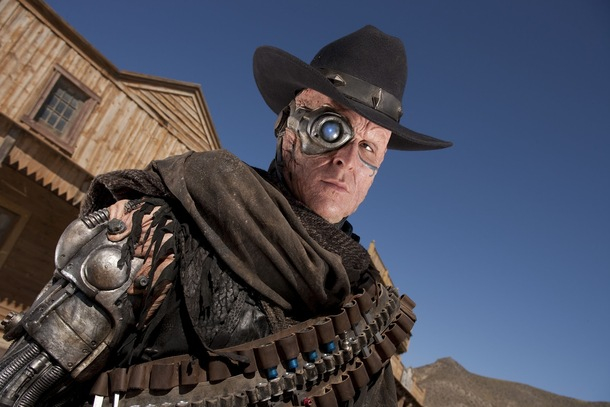Why you can trust GamesRadar+

Writer: Toby Whithouse
Director: Saul Metzstein
THE ONE WHERE In a small town in the old West, the Doctor must decide whether to hand over a "mad scientist" to a cyborg bent on vengeance.
THE VERDICT This Western tale is very surprising in some respects… and totally unsurprising in others.
It’s certainly not the story you might have been expecting from the snatches featured in the series trailers. From those, you’d extrapolate an episode that’s equal parts action and comedy. While the episode does deliver on both those fronts (particularly when it comes to comedy - Matt Smith’s take on a gunslinger swagger as he walks into a saloon and orders “tea… but the strong stuff!” is a particular delight) it’s a third element – ethical debate – which is, remarkably, to the fore.
In the figure of Kahler-Jex, a Doctor who carried out hiderous experiments, creating cyborg soldiers in order to end a war, we have a surrogate for anyone who’s ever done terrible things in the belief that the means does justify the end. This is a story with no clear-cut “bad guy”, only shades of grey – which isn't generally the case in Who . The ensuing debate sorely tests the Doctor’s avowed pacifism and respect for all life, and for a while (until Amy intercedes) it seems like he’s going to break his own moral code. The Doctor’s crossing a line, something the script emphasises (perhaps a little over-literally) by having him… er…. cross a line of stones and bits of wood (a line which seems to have no particularly good reason for existing, other than its metaphorical function).
None of this is totally unexplored territory for Doctor Who . Peter Davison’s Doctor once pointed a gun at the head of Davros (another figure who argued that by ending war he was actually doing good), determined to execute him… but couldn’t go through with it. Tasked by the Time Lords with destroying the Daleks, Tom Baker’s Doctor famously questioned whether he had the right. But both those instances were minor scenes; here, the question of the morality of war is right at the heart of the drama. It’s as if 60% of the running time of “Genesis Of The Daleks” had been taken up with Tom Baker’s Doctor questioning whether it's right to avert the Daleks’ creation. This ethical dimension makes “A Town Called Mercy” a surprisingly mature story.
Otherwise, it’s cosily familiar. Maybe it’s churlish to criticise a Western episode for doing exactly what you’d expect from a Western episode, but whilst it’s pleasing to see those tropes played with, the results occasionally feel a little over-familiar. A scene like the one where the Doctor, having been handed the Sheriff’s badge, refuses to hand over his prisoner will feel fairly old hat to anyone movie-literate. (Not that that's likely to be an issue for your average ten-year-old, of course)
What’s really missing is another twist or two. Whereas “Asylum Of The Daleks” and “Dinosaurs On A Spaceship” kept hitting us with reveal after reveal, the truth about Kahler is let out of the bag comparatively early on, and after that, it’s simply a matter of deciding what to do with him. The result is a story that, commendably, will inspire living room debate, but which when it comes to thrills falls a little way short.
IT’S WOSSISNAME! Adrian Scarborough (Kahler Jex) has a rich and varied CV, but is perhaps best known for playing Pete (one half of forever-arguing married couple Pete and Dawn) in Gavin & Stacey .
NITPICKS Kudos is due to writer Toby Whithouse for addressing two niggling questions, but the answers given aren’t entirely satisfactory.
Firstly, why doesn’t the cyborg simply walk into town and kill Kahler? Okay, it doesn’t want to injure innocent civilians – makes sense. Or at least, it would if the cyborg couldn't teleport about (for short distances, at least). Surely if it can do that it could zap into town at night and take out Kahler without any risk of collateral damage? (And wouldn’t the jail be the first place you’d look?)
Secondly, why doesn’t the Doctor simply use the TARDIS to take Kahler away? Early on, he proposes that as a solution. Later it’s conveniently forgotten.
DOCTOR BASTARD After what the Doctor did to Solomon in “Dinosaurs On A Spaceship”, it seems a theme is developing… Look like we’re back to David Tennant's “no second chances” Doctor – although perhaps it’s more a case of “no chances at all” this time. What’s the betting that the Doctor’s new-found ruthless streak might be the very thing that causes Amy and Rory’s departure?
THE BECHDEL TEST Westerns are generally pretty male-dominated, and “A Town Called Mercy” is no exception. Barring Amy (and the framing narration), the only female character who gets any dialogue is the woman behind the bar... and she gets one line. So definitely no “scenes in which two or more named female characters have a conversation” here.
BEST LINE The Doctor befriends a trans-gender horse: “He’s called Susan. And he wants you to respect his life choices.”
Ian Berriman twitter.com/ianberriman
Read all our Doctor Who series 7 reviews .
Read our Ben Browder interview .
Read our Toby Whithouse interview .

Ian Berriman has been working for SFX – the world's leading sci-fi, fantasy and horror magazine – since March 2002. He's also a regular writer for Electronic Sound. Other publications he's contributed to include Total Film, When Saturday Comes, Retro Pop, Horrorville, and What DVD. A life-long Doctor Who fan, he's also a supporter of Hull City, and live-tweets along to BBC Four's Top Of The Pops repeats from his @TOTPFacts account.



